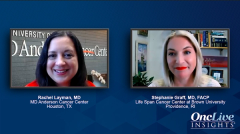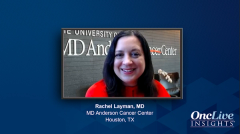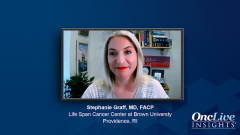
Dosing CDK 4/6 Inhibitors
Rachel Layman, MD, summarizes how to dose CDK4/6 inhibitors in different clinical settings.
Episodes in this series

Transcript:
Stephanie Graff, MD, FACP: Do you want to talk us through the dosing of abemaciclib vs ribociclib because of course, in a few seconds here, we’re going to switch gears and we’re going to talk and maybe even highlight the differences in metastatic vs adjuvant? I had a few conversations at the ASCO [American Society of Clinical Oncology] Annual Meeting about how we’re going to work in our care teams in the clinic to make sure that we’re not having any sort of drug delivery or dosing errors as we have now these different starting doses in different settings.
Rachel Layman, MD: That’s a great point. The abemaciclib dosing in monarchE [NCT03155997] is really the same as the metastatic setting and actually, it’s the simplest of all the CDK4/6 inhibitors regarding the schedule. You take the medicine twice per day continuously so patients don’t have to keep track of their days on and off of therapy and in that way, it’s simpler. It starts at 200 mg as the first dose and then you can decrease it to 150 mg.
Stephanie Graff, MD, FACP: And then with ribociclib?
Rachel Layman, MD: With ribociclib in the metastatic setting, the dose is 600 mg once a day. This drug is given 3 weeks on and 1 week off of every 4-week cycle. So you do have to keep track of the schedule a little bit there. But in the adjuvant setting for their phase 3 trial, they actually used the middle dose, so they went down one dose level to 400 mg.
Stephanie Graff, MD, FACP: Perfect. And then, of course, the next lowest dose down from that is 200 mg, so there’s still room to dose modify. And although we don’t have in the adjuvant setting, evidence that dose modification of ribociclib leads to similar efficacy, we have that data for ribociclib in the metastatic setting that dose modification leads to similar efficacy. So hopefully, we see a longer-term follow-up on NATALEE [NCT03701334] and see similar data for patients having adverse events that we’ll see a continued benefit to dose modification.
Transcript edited for clarity.






































